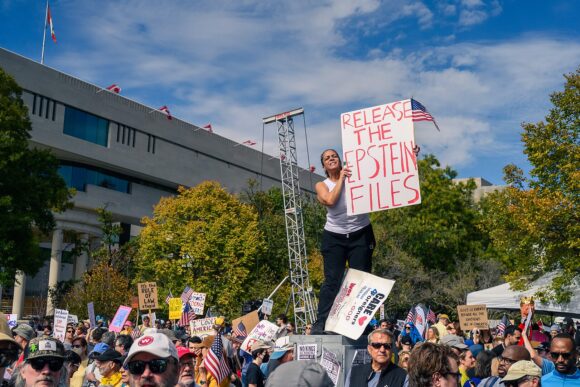In a rare display of bipartisan unity, both chambers of the United States Congress have moved to compel the Department of Justice (DOJ) to release its investigative files on deceased sex offender Jeffrey Epstein.
The House of Representatives overwhelmingly passed the measure by a 427–1 vote, while Senate leaders said they would expedite approval as soon as the bill formally arrives. President Donald Trump, whose endorsement is required for final enactment, has vowed to sign the legislation.
Trump Reverses Position Amid Pressure
Trump’s support marks a notable reversal from his previous opposition to the files’ release, which he had dismissed as a political ploy. He has since urged Republican lawmakers to back disclosure following mounting pressure from supporters and survivors of Epstein’s abuse.
“The timing doesn’t matter to me,” Trump wrote in a social media post on Tuesday afternoon, urging Republicans not to lose focus on what he described as his administration’s “victories.” He has continued to frame the issue as a distraction but insists there is “nothing to hide.”
His past association with Epstein has resurfaced recently after the release of more than 20,000 pages from Epstein’s estate, which referenced Trump and other high-profile figures without implying misconduct.
Survivors Call for Transparency
Earlier on Tuesday, Epstein survivors advocated for the measure at the US Capitol, describing years of silence and failure by institutions tasked with protecting victims. One speaker referred to the prolonged lack of accountability as “institutional betrayal.”
Sky Roberts, brother of the late Virginia Giuffre—Epstein’s most prominent accuser—praised her efforts following the House vote.
“She paved the way for us to come forward as advocates… and we won’t stop,” he said.
Giuffre, who passed away in April, had previously stated she never witnessed Trump engaging in abuse.
Congressional Leaders Pivot Amid Internal Tensions
House Speaker Mike Johnson, who had previously labelled the push as a “Democrat hoax,” voted in favour of the measure. Prominent Republicans including Thomas Massie of Kentucky and Marjorie Taylor Greene of Georgia helped lead the push.
Massie, who has been publicly criticised by Trump for his stance, defended his position, telling ABC News: “In 2030, he’s not going to be the president… those who vote against release will have voted to protect paedophiles.”
Greene, once a staunch Trump supporter, has since clashed with him over the issue, with Trump branding her a “traitor.” Speaking at a press briefing flanked by survivors, she said:
“A patriot is an American that serves the United States of America and Americans like the women standing behind me.”
What the Bill Requires
The legislation mandates Attorney General Pam Bondi to release “all unclassified records, documents, communications, and investigative materials” related to Epstein and his alleged accomplice Ghislaine Maxwell within 30 days of enactment.
Materials expected to be made public include:
- DOJ internal communications
- Interview transcripts from victims and witnesses
- Flight logs
- Names of associated individuals and entities
However, the bill allows Bondi to withhold documents that may compromise ongoing federal investigations or reveal the identities of victims.
Legal Barriers Remain
Despite Trump’s pledge to sign the measure, its implementation may still face challenges. Trump has recently asked the DOJ to investigate Epstein’s alleged ties to major banks and prominent Democrats, potentially complicating the release under the exemption for active investigations.
Trump could have ordered the disclosure without congressional approval, underscoring the symbolic significance of bipartisan action.
Epstein Case Background
Epstein died in 2019 in a New York prison while awaiting trial on sex trafficking charges. His death was ruled a suicide. He had previously been convicted in 2008 for soliciting prostitution from a minor.
During two major criminal investigations, federal authorities seized thousands of documents, recordings and interview transcripts. Ghislaine Maxwell was later convicted and is currently serving a 20-year sentence.






